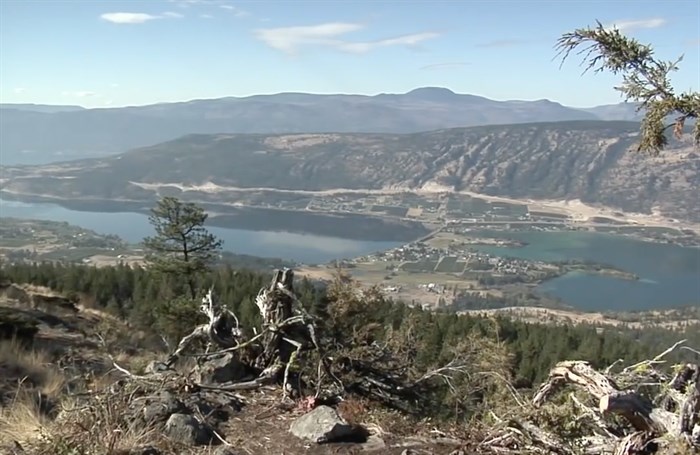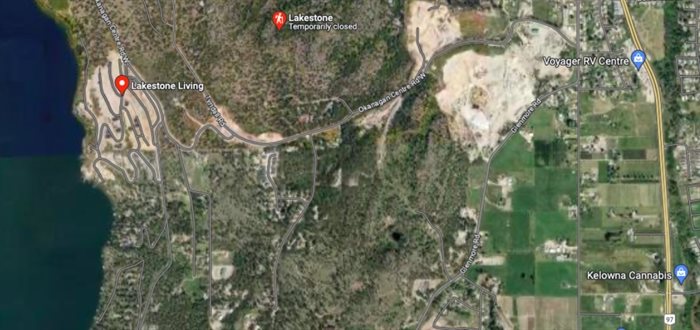How Lake Country plans to double its housing stock
Lake Country was the fastest growing community in the Okanagan over the 2016-21 census period and shows no signs of slowing down.
That means over the next 10 years, up to 500 new homes a year will be needed to accommodate all those who want to live there.
The questions are: where are those homes going to be built and, given that only 66 building permits for homes were issued last year, how is the District of Lake Country going to be able to pick up that pace?
In terms of space to build, there are difficulties, such as the Agricultural Land Reserve.
“That’s the challenge with Lake Country,” Jared Kassel, director of planning and development for the District of Lake Country, told iNFOnews.ca. “One of its attributes, one of its characteristics, is that it’s green and it’s rural and it’s really pretty to drive through because there are so many orchards and vineyards here. But it also means there are limitations to developable areas.”
Essentially, all the undeveloped flat land in the District has to be preserved for farming so housing has to be mostly on hillsides.
That’s great for lake views, as in the case with the Lakestone development.
It’s a massive housing project that started in 2015 in the southwest area of Lake Country overlooking Okanagan Lake.
It has recently filed plans for Phase Six of the eight-phase project that will, ultimately, have 1,365 homes with a mix of single-family, duplexes and multi-family.
But, that’s just a start.
As of the 2021 census, Statistics Canada reported that Lake Country had a population of 15,817 living in 6,852 homes.
Three years earlier, the Lake Country Official Community Plan forecast a 2021 population of 14,000-15,000 depending on how fast it grew.
That plan offered three growth projections for the coming years, from 2-4% per year. The 4% scenario foresaw a 2031 population of 20,500, requiring an average of 430 new homes to be built each year.
Given the reality that the population grew by 22.4% during the last census period, it could reach as much as 24,000 by 2031, requiring closer to 500 homes a year.
The District has struggled in recent years with the time it takes for new housing projects to be approved, but is making efforts to rectify that.
READ MORE: Three-quarters of Lake Country building permits more than a year old
But, it’s still going to take years for construction to start on the the next major development.
That’s projected to be on the McCoubrey Plateau.
It’s up the hill from Lakestone and needs to tie in with a proposed redevelopment of the gravel pits and land around them bordering Glenmore and Okanagan Centre Roads into a business/industrial park.
“The development of the business park is crucial for the future development of McCoubrey Plateau,” Kassel said. “These things go hand in hand. The infrastructure that will support the business park will also support McCoubrey Plateau.”
An area structure plan was approved for the plateau back in 2013 but it never went ahead because of the lack of services like water and sewer.
On Sept. 5, the terms of reference for a new planning process are expected to be presented to Lake Country council.
The original plan was for 2,800 homes on the 228-acre property.
“I would suggest, given the market factors right now that we’re dealing with and the lack of housing in the area, that 2,800 is probably a minimum and it will probably go up from there and focus less on single-family development,” Kassel said.
At about the same time, he’s going to take a proposal to council for a plan to be drafted for the industrial area that includes the gravel pits.
An application has already been filed by the District to remove some of that land from the Agricultural Land Reserve.
Given that, and the fact that there are several different landowners, Kassel doesn’t yet know the exact size of the proposed business park but estimates it to be in the range of 150-175 acres.
That whole effort is being led by the District.
“My job is to set in place a land use strategy for the business park,” Kassel said. “The servicing will be coordinated with that and the actual construction of the servicing will include some realignment of those roads and water and sewer. That’s going to be a huge investment by the District, for sure.”
There’s no timeline on how long that planning process will take but it will likely be well over a year.
The planning for the redevelopment of the 42-acre Tolko site in downtown Kelowna, for example, has been in process for two years. A preliminary draft is expected to go to Kelowna city council this fall.
READ MORE: Public access to waterfront, marina expected in Kelowna Tolko redevelopment plan
While McCoubrey Plateau is to be a massive “planned community,” the demand for housing doesn’t stop there.
Lake Country’s Housing Needs Report, from June of this year, shows a real need for housing diversity.
It showed that 71% of homes had three bedrooms or more and 39% had four bedrooms or more.
It also had the second highest assessed property values (next to Kelowna) in the Okanagan at $972,000 as of July 1, 2022.
The new owners of the notorious Airport Inn Lakeside plan to step in by demolishing that complex and building 360 rental apartments in six buildings. Details are expected to go to council this fall.
READ MORE: Lake Country’s notorious Airport Inn to be replaced by hundreds of rental apartments
In addition, Lake Country Mayor Blair Ireland told iNFOnews.ca that in a recent meeting with three or four developers, he was told they hoped to build about 2,500 multi-family units in the community.
Details have not gone to Kassel and the planning department yet but it’s likely such housing will be built in the downtown Winfield area of the municipality.
These three developments, together, total 5,660 units, which would, essentially, double the existing stock.
That doesn’t include the final build-out of Lakestone or other projects.
How quickly all that gets built will depend on three crucial factors.
One is whether Lake Country will continue to grow as fast as it has been in the past census period, which will provide the financial incentive to builders.
Secondly, can the District of Lake Country staff adapt to the pressures of growth and speed up the approval process?
Finally, will senior governments step in to help fund the water and sewer expansions that will be needed to make all this happen?
To contact a reporter for this story, email Rob Munro or call 250-808-0143 or email the editor. You can also submit photos, videos or news tips to the newsroom and be entered to win a monthly prize draw.
We welcome your comments and opinions on our stories but play nice. We won't censor or delete comments unless they contain off-topic statements or links, unnecessary vulgarity, false facts, spam or obviously fake profiles. If you have any concerns about what you see in comments, email the editor in the link above. SUBSCRIBE to our awesome newsletter here.





